
Banner
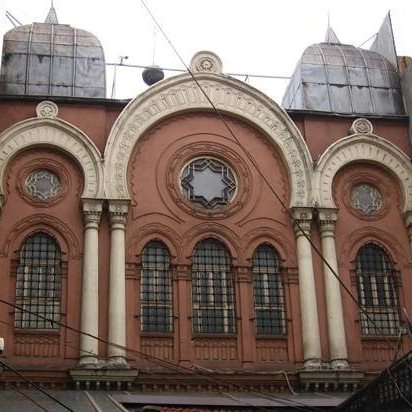
ISIS: ‘Imminent’ attack on Turk Jewish school
ANT KATZ
Hopefully, intelligence will head off a supposed planned attack on the Neve Shalom Synagogue and community centre – above and bottom – which was previously hit by attacks in 1986 and 2003.
The story was also well-covered in the UK newspaper THE TELEGRAPH on Monday. “Jihadists reportedly plan to launch co-ordinated strikes on Jewish children at kindergartens, schools and youth centres,” they reported.“We don’t know when it’s scheduled for. It could be in the next 24 hours or next few days,” a Turkish intelligence source told Sky News. “In light of these circumstances, extraordinary security measures are being taken above and beyond the high alert level already in place by the Turkish police, as well as vigilance within the Jewish community.”
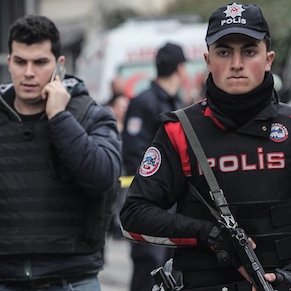
RIGHT: Turkish investigators are wasting no time
Just hours earlier, Israel warned its citizens living in or visiting Turkey to leave immediately, warning of an Islamic State threat.
Last Saturday, March 19. The warning came a week after three Israeli tourists on a culinary tour died after being targeted by an ISIS suicide bomber in Istanbul.
Sky News reported seeing an intelligence report saying ISIS was behind the attack in Istanbul as well as the series of bombings in Brussels on Thursday.
ISIS has been blamed for four of six bombings in Turkey in the past eight months, including a double suicide attack at a peace rally in the capital, Ankara, in October that killed 103 people.
The information about the planned attack came from six ISIS operatives arrested over the past week, according to Sky News. “Undercover and other covert counter-terror measures are being implemented around the clock. This is a more than a credible threat. This is an active plot,” the source is quoted as saying.
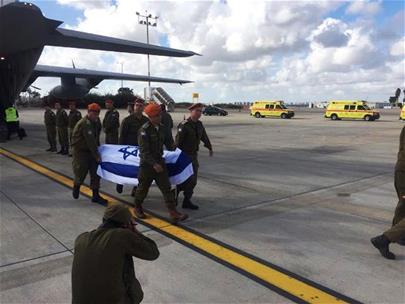 It seems that as their captives coughed up more information, so the Turks issued increasingly targeted warning.
It seems that as their captives coughed up more information, so the Turks issued increasingly targeted warning.
LEFT: IDF planes were allowed to land in Turkey for the first time since 2010 to repatriate 3 dead and 30 wounded Israelis
On Friday, they warned of possible attacks against churches and shuls. By Saturday, Turkish police were warning of possible ISIS attacks against all Christians and Jewish sites. By Sunday, according to Turkish media reports, consulates and embassies were told to remain on high alert.
By Monday, Turkish authorities were able to say with a degree of certainty that they had narrowed the target down to an “imminent” attack on Jewish school in Turkey by ISIS.
Last Wednesday, Turkish President Recep Tayyip Erdogan said in a telephone conversation with his Israeli counterpart that his country is “ready to cooperate with Israel against terrorism”.
Related reads on this website:
- 27 March: ISIS: JIHADISTS CAN DEAL WITH ISRAEL LATER
- 21 March: ISRAELIS KILLED, INJURED IS SUSPECTED ISIS BOMB
How many Jews are in Turkey?
It is estimated that there are between 120 000 and 150 000 Jews in Turkey. While the country’s indigenous Jewish population is between 18 000 and 26 000; the religious tolerance in the country supports a huge number of foreign Jews who live and work there.
The largest group are Israelis, who number 77 000, followed by US Jews (8 000) and Canadians (3 000).
The vast majority, approximately 95 per cent, of Turkish Jews live in Istanbul, with a community of about 2 500 in İzmir and other much smaller groups located in Adana, Ankara, Bursa, Çanakkale, Iskenderun and Kirklareli. Sephardi Jews make up approximately 96 per cent of Turkey’s Jewish population, while the rest are primarily Ashkenazi Jews. There is also a small community of Romaniote Jews.
Turkish Jews are legally represented by the Hakham Bashi, the Chief Rabbi. Rabbi Ishak Haleva, is assisted by a religious council made up of a Rosh Beth Din and three Hahamim.
Thirty-five lay counsellors look after the secular affairs of the community and an executive committee of 14, the president of which must be elected from among the lay counsellors, runs the daily affairs.
The country has 45 shuls, according to Wikipedia. Just over half of them are situated in Istanbul (23); there are 10 in Izmir; three in Bursa; and two in Hatay. The centres of Adana, Ankara, Cankkale, Edirne, Gaziantep, Kilis and Manisa each have one shul.
According to the Jewish website TURKISHJEWS.com, “The (Jewish) community maintains a primary school for 300 pupils and a secondary school for 250 learners in Istanbul, and an elementary school for 140 children in Izmir. Turkish is the language of instruction, and Hebrew is taught 35 hours a week.
If this is an accurate reflection, then the planned attack can only be on one of these schools – or a state school in a popular Jewish area which has a high proportion of Jewish learners.
Possible silver lining: Savage
Sean Savage of JNS.org wrote: “Istanbul terror attack presents brief moment of Turkish-Israeli solidarity”, last Thursday, saying that “the tragedy of Israeli deaths in the Istanbul bombing might have somewhat of a silver lining for Israel, with the attack generating a brief moment of solidarity between the Jewish State and Turkey as they seek to confront the mutual threat of Islamic terrorism emanating from Syria.
“Does this moment portend longer-term improvements for frayed Israeli-Turkish relations?” asked Savage. On March 19, a bomb had killed four people – three Israeli citizens and an Iranian national – and injured 39.
In the immediate aftermath of the attack, Turkish leaders – including President Recep Tayyip Erodgan and Prime Minister Ahmet Davutoglu, who have both been widely known for their outspoken anti-Semitic and anti-Israel rhetoric – were quick to send condolences to Israel.
“I want to send my deepest condolences to the Israeli people and the families that lost their loved ones in this traitorous attack in Istanbul, as they were visiting the city and wanting to get to know our culture better,” Erodgan wrote in a letter. Davutoglu added his condolences “to the families of Israeli citizens who lost their lives in the despicable attack and to the people of Israel, and I wish the injured a speedy recovery”.
On March 23, the goodwill continued as Israeli President Reuven Rivlin phoned Erdogan to thank him for the condolences. Erdogan responded by reiterating that he felt “deep sadness” for the Israeli victims, adding that Turkey is “ready to co-operate with Israel against terrorism”.
Having only days before returned from a ground-breaking visit to SA, Israel’s top diplomat, Dore Gold, visited Turkey to tour the scene of the Istanbul attack. Said Gold: “There is no doubt that the Turkish authorities did the maximum to help Israelis who were in distress and remove the bureaucratic barriers that normally exist after such events.”
In addition to the expressions of goodwill, the Israel Defence Forces (IDF) was allowed to land in Turkey to bring home Israel’s killed and wounded victims, a move that would have been unheard of in recent years at the height of Israeli-Turkish tensions.
Louis Fishman, an assistant professor of history at Brooklyn College who has lived in Turkey and writes about Turkish-Israeli affairs, said he believes the recent attack can “absolutely be an opportunity for both countries to build relations.
“Israel was able to fly in army planes and Israeli soldiers were on Turkish soil, which you haven’t seen in a very long time,” Fishman said on Wednesday. “It is almost like they snapped back into how they used to work together many years ago.”
Turkey, said Fishman, is nowhere near “the regional power it was in 2010, when it broke off relations https://www.sajr.co.za/images/default-source/places/world/turkey-isis-full.jpg” class=”sfImageWrapper”>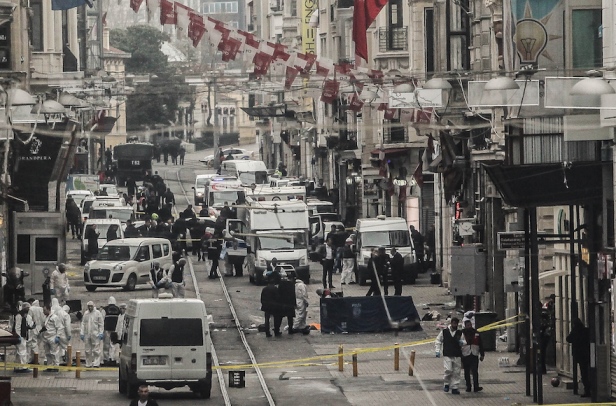
ABOVE: Emergency services inspecting the area following a suicide bombing in central Istanbul on March 19 (Burak Kara/Getty Images)
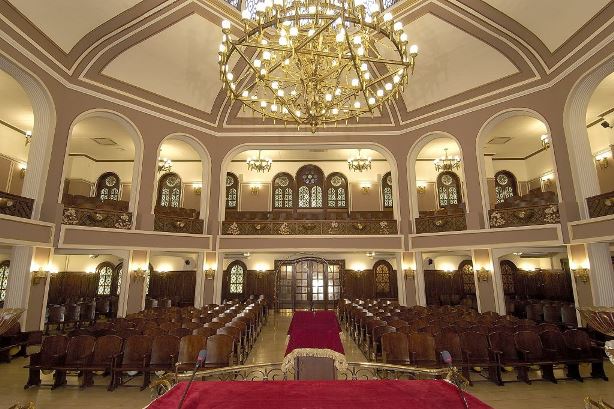
The Neve Shalom Synagogue and community centre is suspected to be the planned target of an ISIS attack this week – hopefully Turkish intelligence will have headed off any planned attack. The shul was previously hit by attacks in 1986 and 2003




